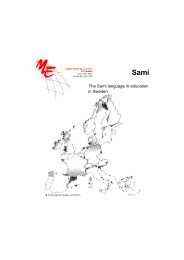Multilingual Early Language Transmission (MELT) - Mercator ...
Multilingual Early Language Transmission (MELT) - Mercator ...
Multilingual Early Language Transmission (MELT) - Mercator ...
Create successful ePaper yourself
Turn your PDF publications into a flip-book with our unique Google optimized e-Paper software.
Parents in Brittany are mostly also learners of the Breton language themselves, they cannot<br />
read or write in Breton. There are almost no written documents in Breton only, usually<br />
documents in Breton are bilingual Breton/French.<br />
Some pre-school provisions organise (grand) parent meetings. There is collaboration with<br />
godparents, elderly people who stimulate the Breton language.<br />
However, the participation of the parents depends on the policy of the pre-school<br />
organisations.<br />
2.5.2 Institutions of the pre-school education<br />
In France, pre-school education relates to day care settings for children from 0 to 3 years.<br />
Most of the pre-school settings in Lower Brittany are for the 0-3 years-old children. In big<br />
cities and in Upper Brittany there are pre-schools for children aged 3-4 years. Even though<br />
the compulsory primary school starts for children aged 6 almost every child in Brittany goes<br />
to (pre-) school from the age of 3 years. In Brittany the term ‘school’ is used for the schoolsystems<br />
for children aged 3 years and older.<br />
In Brittany there are 2 provisions for children up to 3 years:<br />
Childminders<br />
Most of the children stay at childminders 69 (a kind of babysitter), the rest stays at day<br />
care centres or at home provided their parents don't work.<br />
Day care centres<br />
Children attend day care centres when they are about 3 months old up to 3 year.<br />
Even if the compulsory school starts when they are 6 years-old almost every child in<br />
Brittany goes to ‘school’ from the age of 3 years. Most of these day care centres are<br />
opened from Monday util Friday, from 7.30 or 8.00 in the morning, until 6.00 or 6.30<br />
in the evening. Children do not have to stay all day long.<br />
Divskouarn 70 defines two types of day care centres using Breton in pre-school settings for<br />
children from 0 to 3 years-old:<br />
Day care centre Model 1 : At least one activity in Breton each week.<br />
Day care centre Model 2 : At least two practitioners working in Breton, every day<br />
they offer activities in Breton.<br />
Divskouarn want to develop a model 3, were every practitioner of the day care centre works<br />
in Breton, this type of setting doesn't exist yet.<br />
For children from 3 to 6 years old, there are three types of pre-schools:<br />
Public bilingual schools<br />
Public bilingual schools (“école maternelle”) are required to offer at least as much<br />
French as Breton. For the moment there is no official curriculum about teaching<br />
Breton, a lot depends on the teacher. Public bilingual pre- schools are depending on<br />
69 Divskouarn is the organisation for Breton language in pre-school and has 17 day-care centres in their network. In Brittany almost 85% of<br />
the children up to 3, attend childminders. In 2010 there are about 10 childminders speaking Breton. NPLD, the questionnaires from the<br />
project ‘Pre-School Education’ (2010). http://www.npld.eu/currentprojectsbestpractise/pre-schooled/pages/default.aspx [Accessed June<br />
2011].<br />
70 Website of Divskouarn: http://divskouarn.free.fr [Accessed June 2011].<br />
41



